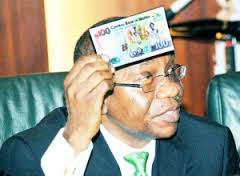Nigeria’s naira fell to a record after the West African nation’s decision to postpone elections increased risks the continent’s worst-performing currency will be devalued.
The naira retreated as much as 1.5 percent to 199.10 per dollar before paring losses to trade at 199.01 by 11:12 a.m. in Lagos. The currency is depreciating for a seventh day to the weakest level since Bloomberg started compiling the data in January 1999, extending losses this year to 7.8 percent, the most among 24 currencies tracked by Bloomberg.
“Traders are seeing higher uncertainties in the market with the postponement of the election,” Lanre Buluro, head of research at Primera Africa Securities Ltd., said by phone from Lagos. “There is speculation on the naira with many buying dollars in anticipation of imminent devaluation before the election or after.”
Investors are delaying decisions to commit money to Nigeria as escalating violence by the Islamist group Boko Haram in the country’s northeastern region prompted the electoral commission to push back the vote by six weeks to March 28. Government opponents said the move will give President Goodluck Jonathan extra time to rally support that has been dwindling as a collapse in the price of oil hits the revenue of Africa’s biggest crude exporter.
Nigeria’s central bank have reduced foreign-exchange reserves to a three-year low in a bid to defend the naira with dollar sales. In November, policy makers weakened the midpoint of the official exchange rate to 168 per dollar from 155 and raised the benchmark borrowing cost to a record 13 percent.
ETF Inflows
The central bank will probably intervene by selling dollars to contain the naira’s decline, said Primera’s Buluro.
“The naira is becoming a campaign tool for the opposition party, the authorities will want to do everything to provide support,” he said.
Yields on Nigeria’s $500 million of Eurobonds due July 2023 climbed seven basis points to 7.45 percent, the highest since Feb. 2. The 195-member Nigerian Stock Exchange All Share Index fell 0.3 percent, declining a fourth day. The gauge is down 16 percent this year, the most among 93 primary equity indexes tracked by Bloomberg.
The Global X MSCI Nigeria Exchange Traded Fund had a record $2.6 million of inflows last week, increasing assets to $17 million in the fund that was started in April 2013.














